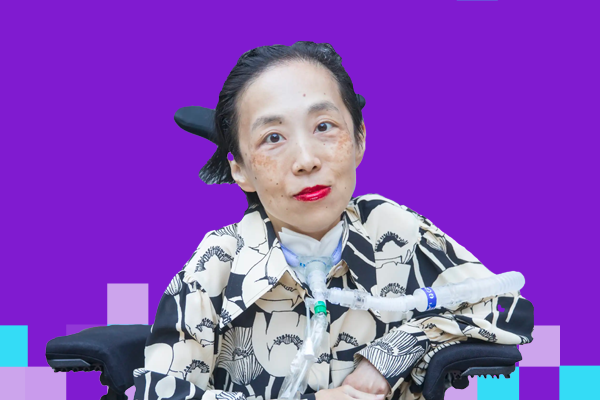
Alice Wong is a writer, editor, and disability justice activist cultivating a vibrant and diverse community of disabled people rooted in joy, abundance, mutual aid, and care. Wong is steeped in disability justice and uses the power of storytelling across various media platforms. She publishes personal stories that expose ableist attitudes, policies, and practices across a society that pushes disabled people to the margins. She also shares her own experiences navigating the world as a disabled person with a progressive neuromuscular disease.
In 2014, Wong founded the Disability Visibility Project (DVP) to amplify the unfiltered voices of disabled people and explore the intersections of race, ethnicity, gender identity, and disability. DVP began with an oral history project encouraging disabled people to interview one another. It has since expanded to include a podcast, a blog, social media, arts projects, and spaces for connection and community building. DVP centers disabled people’s perspectives around topics such as opioid addiction, sexual abuse, mental health, economic insecurity, and education. Wong has edited two essay collections—Disability Visibility: First-Person Stories from the Twenty-First Century (2020) and Disability Intimacy: Essays on Love, Care, and Desire (2024)—that capture the diverse experiences of disabled people and the specific challenges faced by people of color, immigrants, and queer people who are disabled. Wong’s own writings highlight the shortcomings of systems of care available to people with disabilities. In op-eds, a column for Teen Vogue, essays on DVP, and her memoir, Year of the Tiger: An Activist’s Life (2022), she gives unflinching accounts of the challenges of living in the community with autonomy, rather than in an institution.
Wong has also brought broader attention to the widespread ableism and prejudice disabled people face and to the policies that adversely affect them, such as the ban on drinking straws and the disuse of masks in healthcare settings. She used hashtag activism, such as #PodSaveJon and #HighRiskCA, to create change and bring disabled people together in conversation. In 2016, she co-founded #CripTheVote, a nonpartisan online movement that engaged voters and politicians in productive discussions about disability issues in the United States. In another line of work, Wong has helped found organizations that provide material and professional development support to disabled people working in different industries. One such project is the BIPOC Disabled Filmmakers Coalition. With visionary and committed leadership, Wong highlights and supports the work of disabled people, builds relationships and collaborations within the disability community, challenges social and systemic ableism, and increases the political and cultural visibility of disabled people.